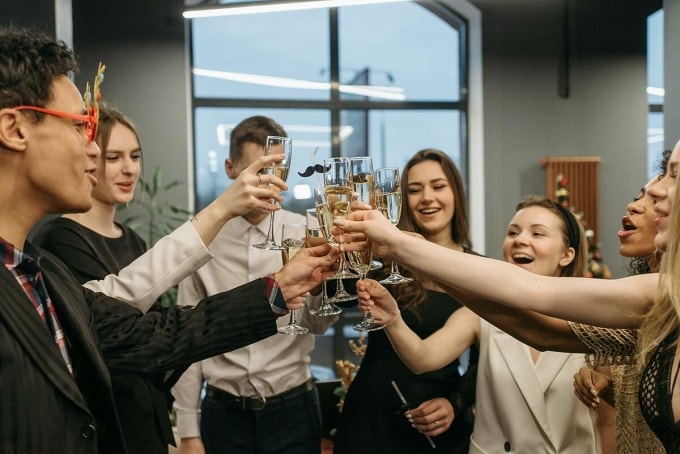Limiting your participation in parties, drinking only on special occasions, and forming groups to abstain from alcohol are ways to limit your consumption of alcoholic beverages during the holiday season.

Wine, beer and other alcoholic beverages are an integral part of the festive season. However, they are also one of the world's leading risk factors for chronic disease and death.
Heavy alcohol consumption can lead to alcoholism. Serious side effects include reduced motor function, liver failure, cancer, and death.
Do not participate in drinking parties or events that require alcohol consumption.
Dr. Stephen Holtsford, medical director of the American Center for Addiction, said parties often involve heavy drinking. He recommended people plan other activities, replacing alcoholic drinks with soft drinks or cocktails.
“For example, you can invite friends over for hot chocolate on Christmas and New Year’s Eve instead of having a cocktail party. If invited to a party, people can consider attending depending on their health status,” he said.
The trick to attending networking events without drinking too much is to be upfront about your drinking tolerance, set limits for yourself and set an alarm on your phone to let you know when it's time to leave, says Dr. Holtsford.
Drink alcohol only on special occasions
Sports nutritionist Kelly Jones recommends minimizing alcohol consumption by drinking selectively, not drinking after work, and not drinking alone at home.
“Try to skip alcohol on weeknights or non-event days,” says Jones.
According to the Centers for Disease Control and Prevention (CDC), moderate consumption is no more than one alcoholic drink per day for women and two drinks or less for men. Excessive consumption is drinking four or more drinks per session for women or five or more drinks for men. Drinking eight or more drinks per week (for women) or 15 or more drinks (for men) is considered heavy drinking.
Staying away from alcohol on weekdays gives you more "space" to enjoy it on special occasions.
Find a "sobriety buddy"
Associate professor Partha Nandi, a gastroenterologist at Michigan State University, suggests that people who want to quit or limit their drinking form a group, turning it into a challenge with specific punishments and rewards.
"You can invite each other to try the best non-alcoholic drinks," said Associate Professor Nandi.
Group members can be spouses, partners, close friends, or co-workers. Having a group of people to keep you company helps keep you on track with your goal of drinking less.
Develop a "drinking strategy"
Associate Professor Nandi advises people to set a limit on their alcohol intake if they are used to drinking alcohol every day.
According to Stephanie Dunne, nutritionist at Nutrition QED, people should consider alternating one alcoholic drink with one non-alcoholic drink (which can be a mocktail, water or sparkling water). This trick can reduce the total amount of alcohol consumed while also helping to stay hydrated, effectively reducing hangover symptoms.
Use non-alcoholic beverages during the festive season
To keep the holiday spirit going, Dr. Dunne suggests opting for mocktails and non-alcoholic beers. Her favorite drink is pure, unsweetened cranberry juice mixed with sparkling water.
"The tannins in the cranberry juice and the bubbles in the sparkling water give it a similar sensation to sparkling rosé, but without the negative side effects that alcohol can bring. Simply served in a champagne glass, this drink is worth raising a glass of," she says.
TB (according to VnExpress)